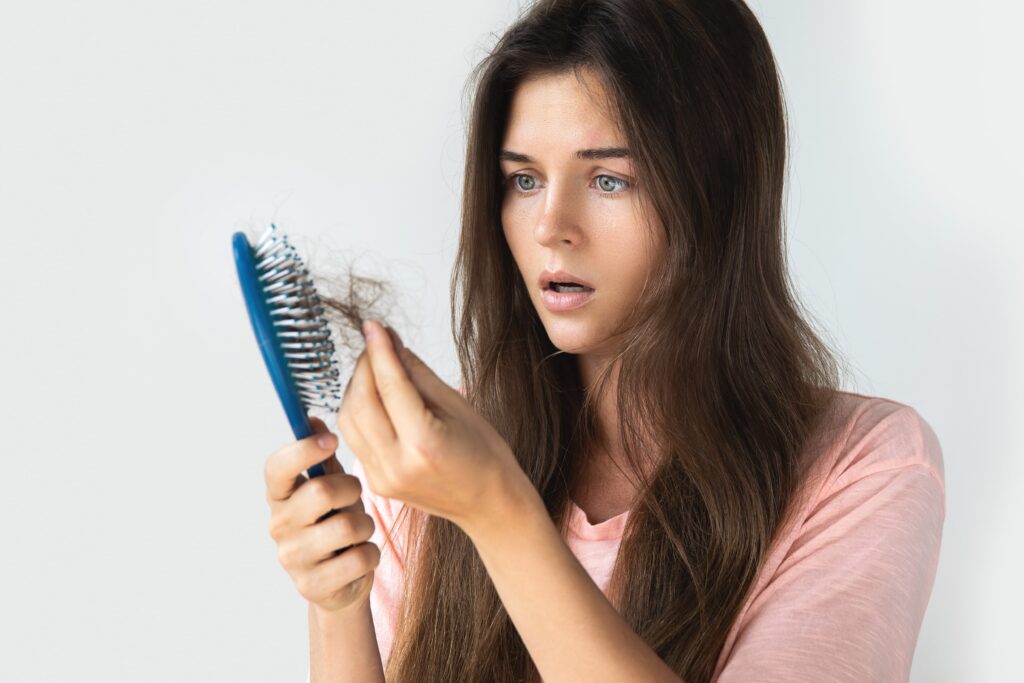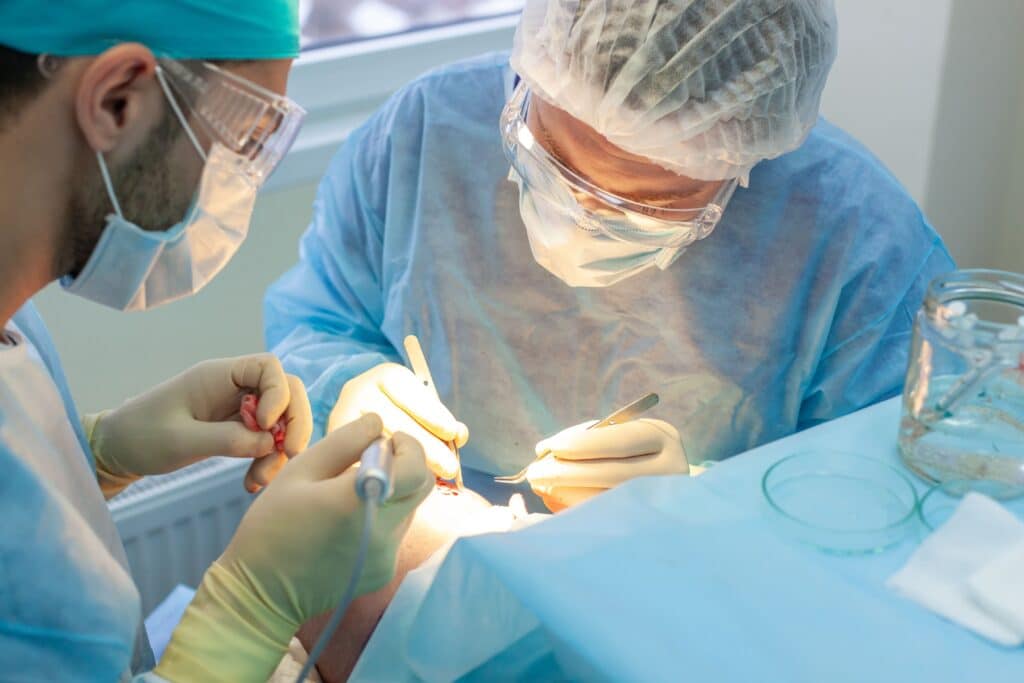Hair loss is distressful and can affect self-esteem and confidence. One significant but often overlooked cause is anemia. Anemia, particularly iron-deficiency Anemia, disrupts the body’s ability to produce hemoglobin. It leads to decreased oxygenation of hair follicle tissues. This article explores anemia hair loss and effective treatments, including dietary adjustments and medical interventions.
What is Anemia?
Anemia is usually characterized by pale discoloration of skin and eyes. It happens when there is a shortage of hemoglobin in the blood. Hemoglobin carries oxygen to tissues in our body.
A decreased amount of red blood cells or hemoglobin can lead to a decreased oxygen supply. An oxygen supply shortage, especially to hair follicles, may lead to hair loss.
Types of Anemia and Their Impact on Hair Loss
There are different types of anemia, and each is different in its way. Let’s take a look at the most common anemias:
Iron-Deficiency Anemia
Iron deficiency anemia affects more than 500 million people worldwide. Iron is essential for our body. Without iron, the body can not produce hemoglobin.
We can consume enough amount of iron from our foods. Sometimes, doctors can also provide extra sources of iron, which can take the form of food supplements.
There are many reasons for iron deficiency. Poor diet, heavy bleeding, or pregnancy are the leading causes of iron deficiency anemia. Iron deficiency and hair loss are closely related.
It is very important to promote cell turnover and support-oxygenation of hair follicles. Low iron levels can weaken hair shafts and lead to hair loss.
Vitamin Deficiency Anemias
Vitamin deficiencies can also lead to certain types of anemia. Megaloblastic anemia is mainly caused by vitamin B12 deficiency. This vitamin helps red blood cell formation along with DNA synthesis. A reduced amount of vitamin B12 means decreased cell division in hair follicles and, ultimately, hair loss.
What Are Iron Deficiency Symptoms?

Symptoms of iron deficiency may include:
Fatigue: Fatigue is one of the hallmark symptoms of anemia. It is also very easy to miss due to its generality. You might feel exhausted. Even light work may make you more exhausted than usual.
Weakness: You may feel weaker than usual. It may take more strength for you to complete simple tasks.
Pale Skin: Hemoglobin is the reason our blood’s color is red. Reduced hemoglobin makes your skin seem paler.
Headaches and Dizziness: Iron deficiency makes it harder for oxygen transportation through blood vessels. It can cause headaches or dizziness.
Cold Hands and Feet: Anemia can cause poor circulation. It can lead to cold hands and feet, as there is not enough oxygen-rich blood reaching these areas.
Hair loss: Anemia causes hair loss, which is a common symptom, especially among women. Studies show that iron deficiency can cause female pattern baldness, with symptoms such as hair shedding, thinning, dry and brittle hair, and a noticeable overall reduction in hair volume.
Why does iron deficiency cause hair loss?
Anemia hair loss is a form of hair loss called telogen effluvium. Most doctors agree that hair loss has many causes. However, the link between iron deficiency and hair loss is significant. Let’s look at the various ways we are susceptible to anemia hair loss:
Oxygen Deprivation: When you don’t have enough iron, your body can’t produce the hemoglobin in your blood. Insufficient oxygen supply impacts the physiological process of hair follicles. It impairs their function and growth, leading to weakened hair strands.
Nutrient Deficiencies: Vitamin B12 and folate are essential for hair nourishment and hair growth. Deficiencies can lead to increased hair thinning.
Hormonal Imbalances: Certain vitamin deficiencies can disrupt hormone levels and influence hair growth cycles.
Is Hair Loss from Anemia Permanent?
Anemia-related hair loss is usually reversible. If you treat your anemia effectively, your hair will grow over time. However, you have to address the underlying cause first. Your body needs essential nutrients for hair regrowth, which can take several months.
Will Taking Iron Supplements Help with Hair Loss?
Iron supplements can significantly help stimulate hair growth if the underlying cause is iron deficiency anemia. Iron is important for producing hemoglobin. It, in turn, provides oxygen and nutrients to your hair.
When hair follicles receive enough oxygen and nutrients, they are more likely to produce healthy hair. You can consult with Cosmedica for the proper dosage of iron essential for you.
How Much Iron Should You Take for Hair Loss?
Treating hair loss depends largely on your type of deficiency. For iron deficiency, you need to consume iron. Iron intake depends on your level of deficiency and overall health. For men, the recommended dose of iron is around 8.7mg.
However, women are more at risk of iron deficiency. Therefore, their recommended dose is about 14.8mg a day until the age of 50. For women aged above 50 years old, 8.7mg is the recommended dose.
How Do You Keep Your Iron Levels Healthy?
Eating a well-balanced diet, lifestyle adjustments and regular health checkups are essential for normal iron level maintenance.
Balanced Diet
Iron Rich Foods: Incorporate foods high in iron, such as fish, poultry, red meat, poultry, spinach, tofu, lentils, and fortified foods.
Avoid Excessive Calcium: Increased amounts of calcium can inhibit iron absorption in your body.
Vitamin C: Vitamin C-rich foods help absorb iron from plant-based sources. To consume more vitamin C, you can include citrus fruits, bell peppers, etc., in your daily diet.
Regular Health Check-Ups
You should follow your Doctor’s recommendations and follow up for regular blood tests to track iron levels.
Healthy Lifestyle
Avoid smoking and excessive alcohol consumption and engage in regular, moderate exercise to improve overall health and circulation.
Hair Transplants
If your hair loss is significant and persistent, you may consider a hair transplant. You can look at hair transplant Turkey before and after results at Cosmedica for transformative results of hair transplants.

Summary
Anemia hair loss is typically reversible with proper treatment. You should ensure your body has all the essential vitamins and minerals. It plays a big part in keeping your hair healthy. A balanced diet and iron-rich foods can help you maintain healthy iron levels.
If your hair loss is persistent, you can always consider the price of a hair transplant in Turkey at Cosmedica Clinic.
